Apr 18, 2022
기초 문법 ~ (으)ㄹ 뻔하다
The grammatical form ㄹ 뻔했다 is used to express narrowly missing an occurrence. It’s a combination of the prospective modifier (으)ㄹ (which expresses a tentative reality) and the descriptive verb 뻔하다 (which in this case means ‘the verge of happening’). This form is mostly used in past tense.
i) Almost occurred, but didn’t
(으)ㄹ 뻔했다 is typically used to indicate something almost happened but did not.
An expression used to express that the incident mentioned in the preceding statement almost occurred but ultimately did not occur.
An expression used to exaggerate a certain past state.
It is usually used with accidental events where the speaker feels relief.
Verb stem ending in a vowel + ㄹ 뻔 하다 :
울다 -- 울 뻔하다 = almost cried
잠을 자다 -- 잠을 잘 뻔하다 = almost slept
놓치다 -- 놓칠 뻔하다 = nearly missed
태우다 -- 태울 뻔하다 = almost burn
치이다 -- 치일 뻔하다 = almost got hit (by something)
쓰러지다 -- 쓰러질 뻔하다 = almost collapsed / almost lost consciousness
넘어지다 -- 넘어질 뻔하다 = almost fell down
떨어지다 -- 떨어질 뻔하다 = almost failed/fell
잊어버리다 -- 잊어버릴 뻔하다 = nearly forgot
실패하다 -- 실패할 뻘하다 = almost failed
Verbs ending in consonant + 을 뻔하다:
늦다 -- 늦을 뻔하다 = almost late
죽다 -- 죽을 뻔하다 = almost died
넘다 -- 넘을 뻔하다 = almost passed
볼 수 없다 -- 볼 수 없을 뻔하다 = almost couldn't see
Example Sentences
1. 오늘 아침에 늦을 뻔 했어. [늦다]
– I was almost late this morning.
2. 저 힘들어서 쓰러질 뻔 했어요.
[힘들다, 쓰러지다]
– I was so tired that I almost collapsed.
3. 너무 슬퍼서 울 뻔 했어요.
[슬프다, 울다]
– I was so sad that I almost cried.
4. 너무 많이 먹어서 토할 뻔 했어.
[먹다, 토하다]
– I ate too much so I almost threw up.
5. 놀라서 소리지를 뻔 했어요.
[놀라다, 소리지르다]
– I was surprised and I almost screamed.
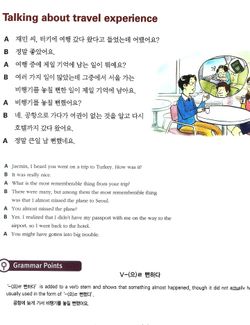
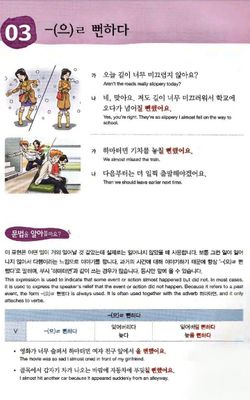
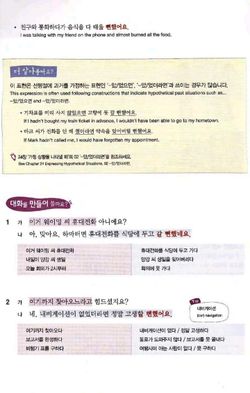
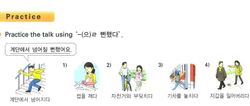
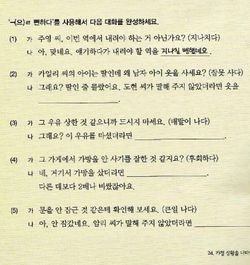
By undefined
6 notes ・ 127 views
Korean
Elementary